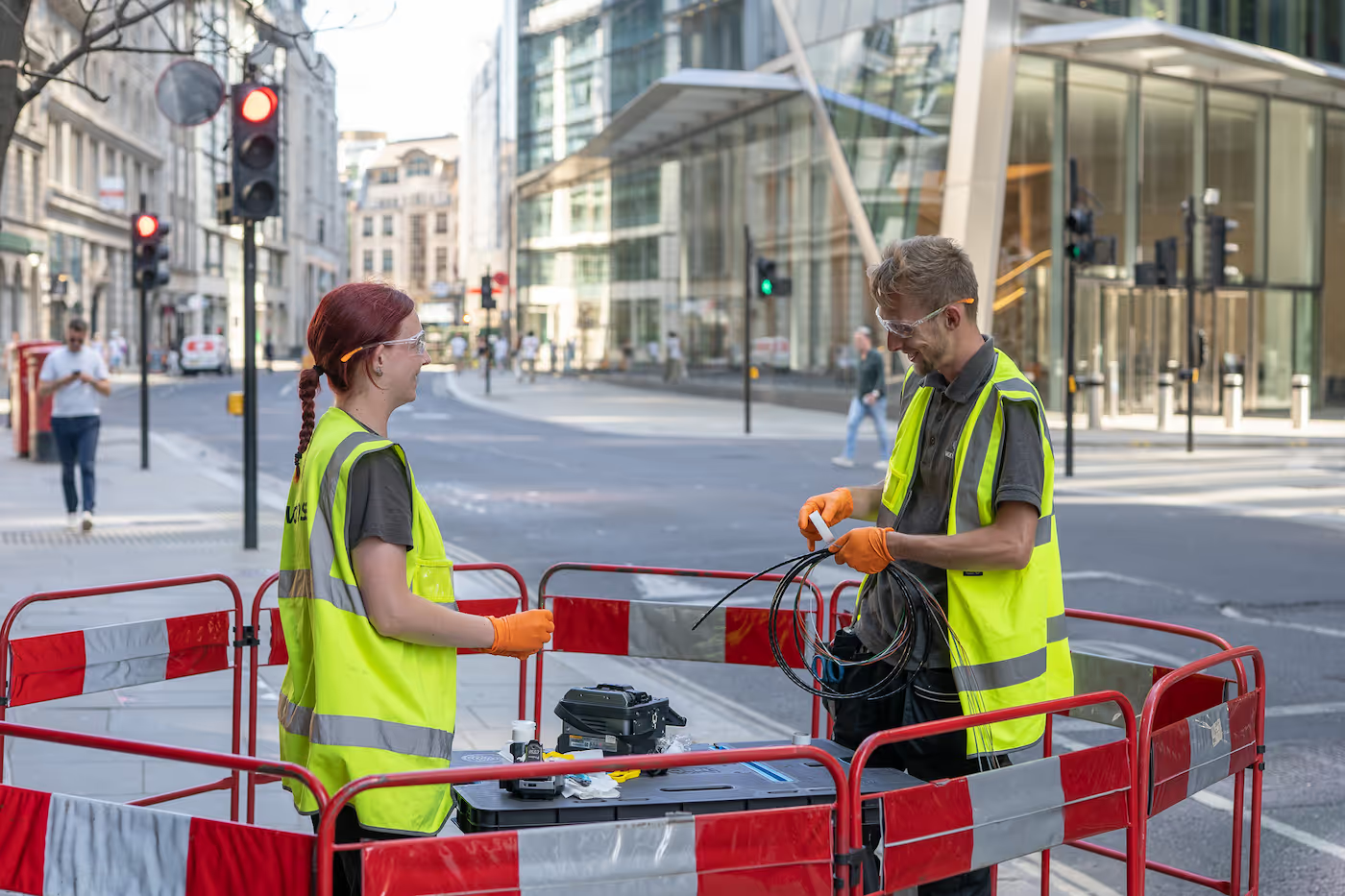Vorboss recognised by Sunday Times as One of the Best Places to Work in the UK
May 18, 2023
|
5
min read

Highlights
Vorboss was named one of the Sunday Times Best Places to Work in the UK and Best Places to Work for Women. We are committed to fostering an inclusive workplace culture in the telecoms industry, with initiatives including the Vorboss Academy and our Female First campaign.
Exciting news! Vorboss has been recognised as one of the Sunday Times Best Places to Work in the UK and Best Places to Work for Women. We couldn't be happier to be recognised for our commitment to creating an inclusive workplace culture within the telecoms industry. Being listed among the 40 best employers in Britain is a real milestone for us.
As the UK's only dedicated enterprise fibre network, our emphasis on inclusion, equity, and diversity has positioned us as a leader in driving positive change within the tech space. This wouldn't have been possible without our people-centric approach that runs through all areas of the business, and we are proud to be recognised by the prestigious Sunday Times Best Places to Work awards.
Jaye O'Callaghan, our Chief People Officer, says, 'We have worked tirelessly to make Vorboss a destination for some of the most ambitious, hard-working and friendly people. We're proud to be the flag bearer for the whole telecommunications industry and are thrilled that our team has been acknowledged in this way.'
Let's dive deeper into how Vorboss embraces diversity, promotes accessibility, invests in employee development, and supports women in the workplace. We're here to reshape the telecoms industry, and this recognition from the Sunday Times fuels our passion even more.

Putting people first
The Sunday Times Best Places to Work awards are all about the employees, so the results are solely based on a survey sent out to our incredible team. With topics ranging from reward and recognition to empowerment and wellbeing, the survey covers it all and is considered a trusted barometer of employee-centric businesses across industries.
We have built a workplace that revolves around our people, with a focus on diversity, accessibility, and employee development. Supporting women in the workplace is also a top priority for us.
Our goal? To provide the absolute best job experience for our employees while prioritising their individual needs.
Embracing diversity and accessibility

In the telecoms industry, diversity and accessibility have long been crucial challenges; that's why we have adopted a proactive approach. Our CEO and founder Tim Creswick comments, 'We're only going to change the face of the industry if we continue to attract a diversity of thought and talents in the coming decades.'
We firmly believe that people and culture are the bedrock of a thriving business. From day one, we've implemented a wide range of initiatives to support employees from various backgrounds and cultivate a genuinely diverse, engaged, and motivated workforce.
A shining example of this commitment is our in-house training academy. The Vorboss Academy is designed to be inclusive, requiring no prior experience and serving as a pathway to a telecoms career for anyone who aspires to it. We're proud to offer this opportunity to individuals from various backgrounds, ensuring that a career in telecoms is accessible to all.
Nurturing growth and development
We strongly emphasise continuous employee development. We start by going the extra mile to empower our team with additional educational resources. If they have a specific request for further education, professional development, mentorship, or professional certifications, we're here to make it happen. Our office library is also stocked with a selection of self-development books, providing a wealth of knowledge and inspiration.
Investing in our team's growth is essential for their success and satisfaction. That's why we've introduced a unique opportunity for all our staff: an additional 5% of their salary dedicated to life-enhancing training. We want our employees to be free to choose the training opportunities that resonate with them, whether it's leadership coaching or swimming lessons, to support their personal and professional enrichment.
Empowering women in the workplace

We take great pride in being recognised as a workplace that provides unwavering support for women. We work diligently to create an inclusive environment where all individuals feel valued. Our commitment to gender equality is reflected in our operations and recruitment practices.
We've taken significant strides in diversifying our workforce by actively recruiting female Installation Technicians, Warehouse Operatives, and Mobile Field Support members. This intentional focus on gender diversity has fostered a diverse and vibrant workplace. Not only does this contribute to better employee retention, but it also attracts new talents who are inspired by our inclusive culture. In fact, within the telecoms industry, our Installation Team boasts an impressive 35% representation of women, a unique achievement.
We're determined to break barriers and set new standards in the telecoms sector and beyond. Our vision is to see more women occupying critical roles across our business, paving the way for a more equal and gender-balanced workforce. By championing gender diversity, we strive to create a workplace that is representative of the world we live in.
To ensure inclusivity, we've implemented specific measures that address the unique needs of women in the workplace. We provide welfare vans that offer privacy and relief to our Installation Technicians. Specially sourced tools and uniforms are available to ensure the perfect fit for women. Additionally, we recognise the importance of period days, flexible work arrangements, and family-friendly policies.
Leading the way for positive change
Our initiatives should become the industry standard, fostering high-performance teams, inclusive workplace cultures, and sustainable business practices.
As Tim Creswick puts it, 'It's fantastic to be recognised as one of the UK's best companies to work for, not just in telecoms, but across all sectors. We hope this signals a positive change in how telecoms companies are regarded in the wider UK market. We're only going to change the face of the industry if we continue to attract a diversity of thought and talents in the coming decades, and this marks an important milestone in recognising the immense effort invested by our team to date.'
Thanks to the Sunday Times for naming us as one of the best places to work in the UK and highlighting the inclusive workplace culture we're so proud of.
We're hiring! Visit the vacancies section of our website to check out our live roles.
Tell us about yourself so we can serve you best.
More articles

Heading 1
Heading 2
Heading 3
Heading 4
Heading 5
Heading 6
Lorem ipsum dolor sit amet, consectetur adipiscing elit, sed do eiusmod tempor incididunt ut labore et dolore magna aliqua. Ut enim ad minim veniam, quis nostrud exercitation ullamco laboris nisi ut aliquip ex ea commodo consequat. Duis aute irure dolor in reprehenderit in voluptate velit esse cillum dolore eu fugiat nulla pariatur.
Block quote
Ordered list
- Item 1
- Item 2
- Item 3
Unordered list
- Item A
- Item B
- Item C
Bold text
Emphasis
Superscript
Subscript

Heading 1
Heading 2
Heading 3
Heading 4
Heading 5
Heading 6
Lorem ipsum dolor sit amet, consectetur adipiscing elit, sed do eiusmod tempor incididunt ut labore et dolore magna aliqua. Ut enim ad minim veniam, quis nostrud exercitation ullamco laboris nisi ut aliquip ex ea commodo consequat. Duis aute irure dolor in reprehenderit in voluptate velit esse cillum dolore eu fugiat nulla pariatur.
Block quote
Ordered list
- Item 1
- Item 2
- Item 3
Unordered list
- Item A
- Item B
- Item C
Bold text
Emphasis
Superscript
Subscript

.avif)

.avif)

